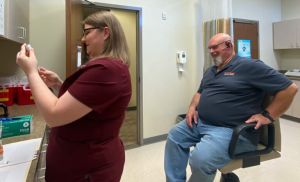HMG offers both skin and blood allergy testing for specific allergens known to be associated with allergic rhinitis, sinusitis, asthma, atopic dermatitis, insect anaphylaxis, etc. Additionally, we offer custom treatment sets for immunotherapy for a large number of allergens that cause frequent allergy related medical problems.
We’re also pleased to provide counseling for environmental modification for certain allergens that can dramatically reduce the patients’ exposure to these antigens with concurrent improvement in their symptoms.
Regarding food allergies, we provide specific counseling for possible food allergies, including identification of food allergen ingredients that may not be obviously apparent to the average consumer. Please note that we do not offer immunotherapy for food allergies.
-
Pre-visit instructions for allergy testing
Please keep in mind your initial appointment will take approximately 2 to 3 hours and plan your schedule accordingly. Visit our allergy test preparation page for instructions on how to prepare for the test.
-
Who needs allergy testing?
- Patients with any recalcitrant problem and symptom that may have an allergic basis who have not responded to empiric treatment for their symptoms.
- Patients with suspected allergies who have failed to respond to medical treatment, dietary modifications, or environmental modifications.
- Patients who have had severe reactions such as anaphylaxis to insect stings.
- Patients with suspected atopic dermatitis who experience persistent symptoms, despite medical treatment.
- Asthma patients who are difficult to control medically, who might have suspected allergic triggers for the reactive airway.
-
What does allergy testing reveal?
- It can confirm or deny the existence of allergies.
- It can identify specific allergies to offending antigens.
- It can give indication of possible severity of the allergy to a particular antigen.
- It may identify the offending agents that trigger atopic dermatitis or asthmatic bronchoconstriction.
-
How does allergy testing benefit the patient?
- If the testing is negative for allergies, the patient does not need to spend the time of money trying allergy medications for their problems.
- If allergy testing is positive, it confirms the validity of using allergy medications in attempt to control their symptoms.
- If they fail attempts at control with medications or minimizing exposure to allergens, they are candidates for immunotherapy, which can give them excellent control of their symptoms.
- Positive results for certain allergens can lead the physician to educate their patients and their family in specific environmental recommendations to dramatically reduce their exposure to certain antigens, such as house dust, dust mites, animal saliva/dander’s, mold/mildew/fungi. These recommendations, if instituted by the patients and their families, can lead to dramatic reduction in exposure to these antigens with concurrent improvement in their symptoms.
- Specific immunotherapy for patients with severe allergic reactions to envenomation to wasps, hornets, bees, fire ants, etc. could save the patients life in the future if they are stung again by these insects.
-
Immunotherapy
Allergy injections, or immunotherapy, are custom-mixed in our office for each individual patient. Each mixture contains the allergens to which the individual patient is allergic.
The beginning concentration of each allergen is the mixture determined by the relative “allergenicity” of each antigen. Only with accurate allergy test results can you create the specific allergy mixture for each patient. This would be impossible without allergy testing the patient.



